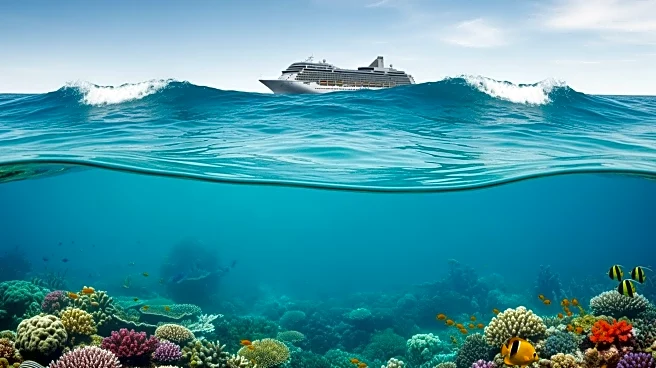What's Happening?
The Côte d'Azur region in France is set to introduce new regulations aimed at reducing the number of cruise ships docking at its ports. This decision follows public concerns over the environmental impact
and the strain on local infrastructure caused by large cruise ships. The new rules will limit the number of cruise ships with more than 1,300 passengers to one per day in ports such as Nice, Cannes, and Villefranche. Additionally, only ships with a maximum of 3,000 passengers will be allowed, and the total number of passengers disembarking daily will be capped at 2,000. During peak season in July and August, a maximum of 15 ships per month will be permitted. These measures are intended to protect the quality of life for residents and promote sustainable tourism.
Why It's Important?
The introduction of these regulations is significant as it addresses the growing concerns over the environmental and social impacts of cruise tourism. By limiting the number of large cruise ships, the region aims to reduce pollution and preserve the local ecosystem. This move could set a precedent for other popular tourist destinations facing similar challenges. The restrictions may also impact the cruise industry economically, as fewer ships will be able to dock, potentially reducing revenue from tourism. However, the regulations are designed to balance economic interests with environmental and social responsibilities, ensuring that tourism remains sustainable in the long term.
What's Next?
The new regulations will undergo a 21-day electronic public consultation before being implemented. If successful, these measures could lead to stricter environmental standards for cruise ships, including emission reductions within three nautical miles of the coast. In cases of high pollution levels, further restrictions or cancellations of port stops may be enforced. The local authorities are optimistic that these rules will create a balance between economic benefits and the protection of local interests. The cruise industry may need to adapt to these changes by exploring alternative routes or investing in more environmentally friendly technologies.
Beyond the Headlines
The decision to limit cruise ship access highlights broader issues of sustainable tourism and environmental conservation. It reflects a growing trend among tourist destinations to prioritize ecological preservation over short-term economic gains. This shift may encourage the cruise industry to innovate and adopt greener practices, potentially leading to long-term benefits for both the environment and the industry. Additionally, the regulations could influence public perception of cruise tourism, prompting travelers to consider the environmental impact of their vacation choices.









